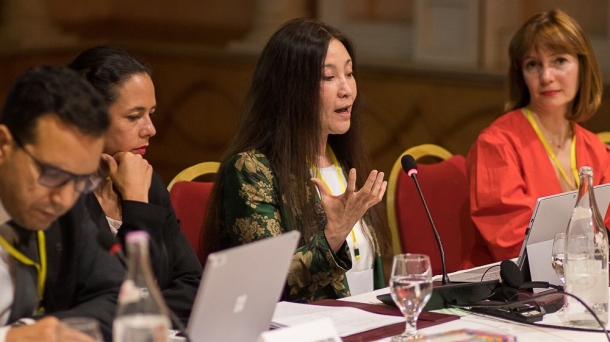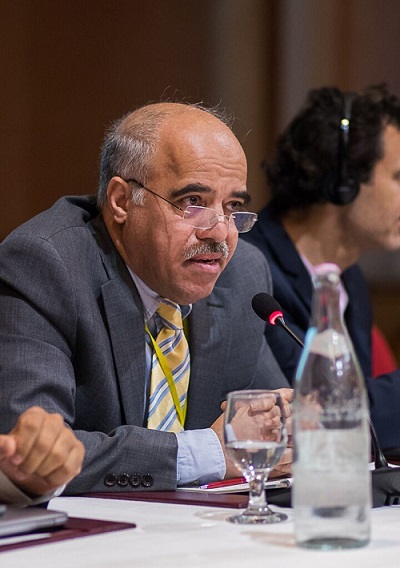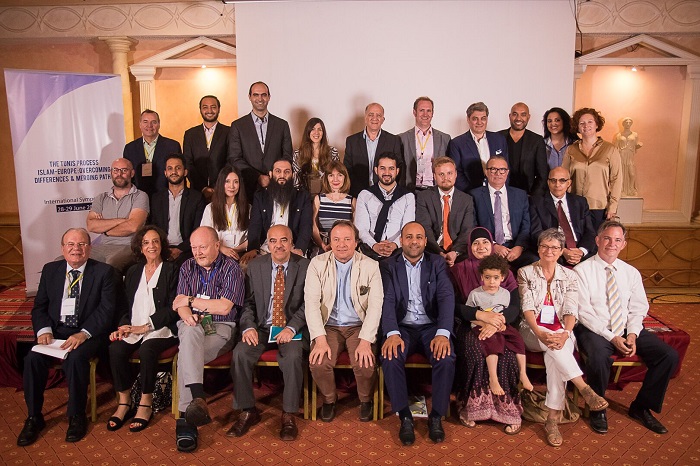
Al Jazeera Centre for Studies and the German Dialogue of Civilizations Institute develop a new vision for relations between Europe and Islam.
Al Jazeera Centre for Studies (AJCS) and the Berlin-based Dialogue of Civilizations Institute (DOC) organized an international symposium in Tunis on 28-29 June 2019, under the auspices of the Tunisian presidency, titled “Islam and Europe: Overcoming Differences, Sharing Paths.” The symposium was attended by a distinguished group of researchers and experts from several Arab, Islamic and European countries specializing in religion, civilizational dialogue, political and civil rights, political science and the social sciences.
There were four main panels at the symposium, followed by focus group discussions among three groups of participants. The first panel chaired by Scherto Gill, Executive Secretary at the Guerrand-Hermès Foundation for Peace, addressed the topic of Islam’s impact on Europe, looking at three specific issues: social and cultural dimensions, effects on public policies, and the prospects for multicultural and multi-faith dialogue.
The second panel took up influences moving in the other direction, addressing the influence of the Western culture on Islamic societies. Chaired by Mohammed Cherkaoui, Senior Researcher at AJSC, the panel approached the issue from three perspectives: influences on Islamic states, influences on Muslims in Europe, and prospects for multicultural and multi-faith dialogue.
The first two panels and focus groups helped identify a set of challenges to bridging divides between Europe, European Muslims, and the Islamic world and began to lay out an alternative vision to bring views together and establish practical approaches to facilitate cultural, religious and civilizational dialogue between the two sides.
The third panel, titled “The Strategic Foresight” and chaired by Jean-Christophe Bas, President and Executive Director of the DOC, offered more than 30 participants an open, interactive platform to follow up on the previous discussions and exchange views. The discussion spotlighted several issues raised by participants, including the problem of defining Islam and eschewing generalizations to avoid reaching shortsighted, partial conclusions. Participants also stressed the importance of remembering the cultural and historical dimensions of the religions of the region’s peoples and supporting the foundations for coexistence, arguing that many of the ideas about these religions have been influenced more by cultural and historical factors than by facts about their religious and legal structure.
Noting that ideas that were difficult to accept in the past become more acceptable with time, participants said that this is often forgotten in the discussion of current issues. While people engaged in such discussions may believe certain issues are impervious to change, the history of ideas shows that acceptance and understanding of these concepts may simply be a matter of time.
At the end of the symposium, Cherkaoui said in his closing speech that the distinguishing feature of this research gathering is its epistemological approach, which seeks to develop practical tools and mechanisms to apply alternative ideas, visions, and conceptions for acceptance of the other; and to transmit foundations for a shared existence based on mutual understanding and interests.
 |
| Dr. Mohammed Cherkaoui, senior researcher at Al Jazeera Centre for Studies. [AlJazeera] |
The press release for the symposium explained the pragmatic approach of the Tunis symposium, which will pave the way for future symposiums as part of an effort to assess the yields of dozens of conferences and seminars that have taken up the topic of the dialogue of civilizations over the past four decades. Bas said, “The Tunis Process is designed to be a powerful example of dialogue in action and what it can achieve. This is not about scholarly theological debate or rehearsing well-worn tropes about migration or other matters between Islam and Europe that dominate the news headlines. We want to discover what people can learn from each other when they come together in an atmosphere of mutual openness to listen to the perspectives of others with no compromise. This is why the Tunis Process puts cultural practices front and centre, with participants who are at the vanguard of the links between Islam and Europe. The main outcome will be to evaluate what can be achieved and what can be learned from the experiences of participants in various scientific and artistic fields, and how we can use this to overcome differences and establish shared paths.”
Cherkaoui said that AJCS “as a think-tank in the global South, looks forward to collaborating with DOC and the presidency of Tunisia, in line with the spirit and vision of the globally-sought trajectory of the dialogue of civilizations in an era of right-wing politics, populism and extremism. AJCS seeks to solidify positive engagement between its partners in the North and the South, and reposition the Islam-Europe relationship on the basis of a better understanding and a new vision of cooperation to help strengthen the virtues of both civilizations and cultures.” He added that AJCS “considers the Tunis symposium and coming symposiums an intellectual platform for engagement, construction and achieving results to meet the social and cultural challenges of Arab and Muslim communities throughout Europe. Through this partnership, AJCS hopes to develop a new multi-disciplinary, innovative approach to foster better relations between Islam, Europe, Arabs, Muslims and Europeans.”
 |
| [AlJazeera] |